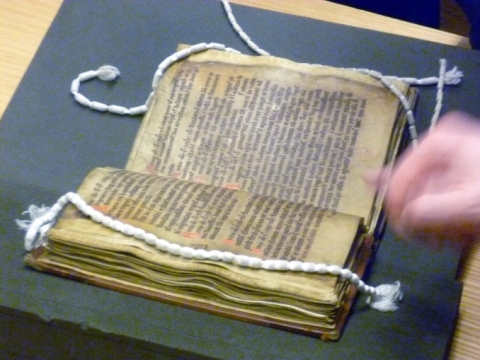Campaign continues for the return to Isle of Man of the Chronicles of the Kings of Mann and the Isles

The Chronicles of the Kings of Mann and the Isles were written in Latin in 1261 or 1262. They record, year-by-year from 1016, the significant events in Manx history of that time. There has been a long standing campaign for the return of the Chronicles of the Kings of Mann and the Isles to the Island. The manuscript is currently being 'held' (for want of a better word), in English hands at the British Library in London. Recently the campaign gained new publicity when a questionnaire was circulated on the subject.
The Chronicles were compiled at Rushen Abbey in the Isle of Man (Manx: Mannin). Rushen Abbey was founded in 1134 by Monks of the Sauvignac Order on land granted to them by Óláfr Guðrøðarson (died 29 June 1153) who was a twelfth-century King of the Isles. The Kingdom of the Isles, also known as the Kingdom of Mann and the Isles, comprised the Hebrides, the islands of the Firth of Clyde and the Isle of Man from the 9th to the 13th centuries AD.
The location of the Abbey was selected due to its close proximity to Castle Rushen, (Manx: Cashtal Rosien) a medieval castle and stronghold of the Kings of Mann and the Isles, located in the Island's historic capital, Castletown (Manx: Balley Chashtal). The ancient ruins of Rushen Abbey are in the village of Ballasalla (Manx: Balley Sallagh).
The Chronicles of the Kings of Mann and the Isles are among a number of treasures and artefacts from the Celtic lands that remain in collections in England. Once plundered, it seems the English are very reluctant to give anything up. When thinking of items taken from other countries, often called to mind are the so called Elgin Marbles. They are a collection of Classical Greek marble sculptures that were originally part of the temple of the Parthenon and other buildings on the Acropolis of Athens. They were removed and shipped to England, in what the poet, peer and politician Lord Byron described as an act of vandalism or looting. Greece has been demanding their return from the British Museum in London.
Related Links:
https://www.transceltic.com/welsh/remains-of-red-lady-of-paviland-need-b...
https://www.transceltic.com/blog/one-of-scotland-s-oldest-surviving-book...
https://www.transceltic.com/scottish/return-home-of-viking-lewis-chessmen






